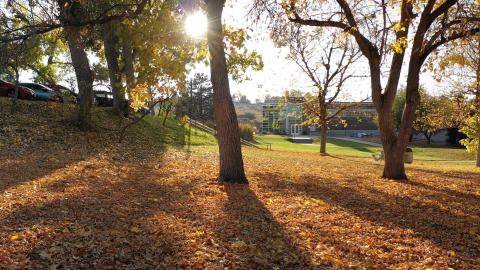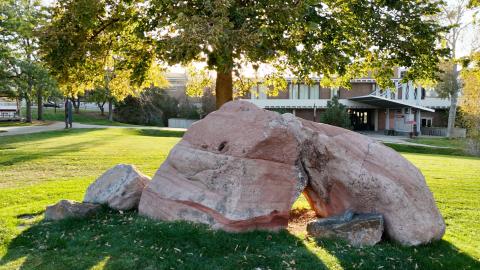ALWAYS CALL 911 FIRST.
If you are experiencing a Mental Health Crisis or are in need of referral services immediately, please call the Colorado Crisis and Support Line at 1-844-493-8255.
Services can provide support for:
- Managing stress and anxiety
- Overcoming depression
- Relationship issues
- Grief and loss
- Adjustment difficulties
- Students needing a referral for additional services or support


- Call the Behavioral Health Counselor's direct phone line, 303-914-6655, to request an initial meeting with the Behavioral Health Counselor.
- Together the student and counselor will decide if short-term individual therapy or a referral to other services will best meet the student's needs.
- If the student can benefit from brief counseling services or consultation an appointment will be scheduled at a time that works for both the counselor and student.

Your first appointment will include completing a few brief forms followed by meeting with the BHS counselor to talk about your concerns. At the end of the initial appointment, the counselor and student will decide upon a course of action for future treatment. During this time, you are encouraged to express your feelings honestly and ask any questions you may have. You might find that a few sessions with the counselor will help you get back on track, or that your needs will be better served by other providers, at which point community referrals will be offered.

If you need to cancel an appointment, please do so at least 24 hours in advance, whenever possible so that another student may fill that appointment time. Call 303-914-6655 and leave a message, including your name, appointment time, and phone number.
In the event of bad weather or other campus closures, please call 303-914-6100. If RRCC is closed, your Behavioral Health Counselor or a Student Health and Counseling Center representative will contact you when the campus re-opens to reschedule your appointment.

To provide our students with convenient support, RRCC students can access a variety of virtual care options through TimelyCare directly from their phones or devices.
Click here to learn more about TimelyCare and receive on-demand services now.
Local Mental Health Services
Colorado Crisis Services http://www.coloradocrisisservices.org
Jefferson Center http://jcmh.org
Red Rock Recovery Center http://www.redrockrecoverycenter.com
Mental Health Center of Denver http://www.mhcd.org
Community Reach Center https://www.communityreachcenter.org
All Health Network https://www.allhealthnetwork.org/
Online Resources
Resources A-Z https://www.jcmh.org/library
Let’s Talk Colorado! http://www.letstalkco.org
Make It OK http://www.makeitok.org
The Science of Success Podcast http://www.successpodcast.com
ULifeline http://www.ulifeline.org
The JED Foundation http://www.jedfoundation.org
The Jordan Porco Foundation http://www.rememberingjordan.org
National Alliance on Mental Illness http://www.nami.org
National Suicide Prevention Lifeline http://www.suicidepreventionlifeline.org
AC’s Guide to Student Mental Health http://www.affordablecollegesonline.org
Active Minds http://www.activeminds.org
My Strength http://www.mystrength.com
Man Therapy http://www.mantherapy.org
Cure Stigma http://www.curestigma.org
The Hilarious World of Depression Podcast http://www.apmpodcasts.org/thwod
Mindful blog http://www.mindful.org
Tiny Buddha blog http://www.tinybuddha.com/blog-posts/
Search Inside Yourself Leadership Institute blog http://www.siyli.org/resources/category/blog
A Lust For Life blog http://www.alustforlife.com
The Art of Living blog https://www.artofliving.org/us-en/blog
The Positivity Blog http://www.positivityblog.com
The Steve Fund http://www.stevefund.org/crisistextline/
Safe 2 Tell Colorado http://www.safe2tell.org
Early Milestones Family Resources https://earlymilestones.org/family-resources/
How to Deal with College Stress as a Medical & Healthcare student https://www.edumed.org/resources/medical-health-student-guide-to-stress/
RRCC Online Mental Health Screenings
Help Yourself, Help Others Website
Anonymous online mental health screenings are a quick way to determine if you or someone you care about may need to reach out to a doctor or mental health professional for an evaluation. Screenings are available for alcohol and substance use, depression, PTSD, and other mental health concerns. These are educational, not diagnostic tools. Each screening takes only a few minutes, and at the end, you will be presented with information and next steps.
For mental health emergencies or referral services from anywhere in the state of Colorado, call the Colorado Crisis & Support Line at 1-844-493-TALK. This is a 24/7, 365 free service offered in Colorado.
Suicide Prevention Emergency Contacts can be read here.
To find your nearest 24/7 Walk-in Mental Health Crisis Clinic click here (link is external) and scroll to the bottom of the page. The closest Mental Health Crisis Clinic to RRCC is at Wheat Ridge Crisis Center @ 4643 S. Wadsworth Blvd Wheat Ridge, CO 80033
National Suicide Hotline: 800-273-TALK (8255)
National Crisis Text Line: text HELLO to 741-741
IF YOU ARE IN IMMEDIATE DANGER or IN NEED OF EMERGENCY MEDICAL TREATMENT, ALWAYS CALL 911 FIRST or go to your nearest emergency room.
Top Mental Health Challenges Facing College Students
This guide helps to identify the signs and symptoms of common mental health issues for college students and where and when to seek help.
Suicide Prevention
The following links provide information on prevention, research, FAQs, survivor information and what to do if someone you know is thinking about suicide:
American Foundation for Suicide Prevention
NIMH · Suicide Prevention
Suicide Prevention | SAMHSA
Coping with Suicide Loss (Find an in-person Support Group)
Depression
What is depression? What are the signs and symptoms of depression?
Depression Screening : Do you think you might have depression? Take this screening to find out if you should seek professional help for your symptoms of depression.
Information on Suicide and Depression Awareness for Students
RRCC Online Mental Health Screenings. Brief, anonymous screenings can help you determine if you or someone you care about may need to reach out to a professional for help in dealing with depression or bipolar disorder.
Anxiety
What is anxiety? What are the signs and symptoms, diagnoses and treatments?
Anxiety Screening: Do you think you might have anxiety? Take this screening to find out if you should seek professional help for your symptoms of anxiety.
Student Guide to Surviving Stress and Anxiety in College and Beyond
RRCC Online Mental Health Screenings. Brief, anonymous screenings can help you determine if you or someone you care about may need to reach out to a professional for help in dealing with generalized anxiety disorder or PTSD.
Good Self Care
- Exercise regularly, establish a sleep routine and get 6-8 hrs./night, eat healthy foods
- Practice Deep Breathing, Relaxation Exercises, Mindful Meditation
- Get Outdoors in the fresh air and sunshine
Tips:
- Talk it over: With a friend or counselor
- Change attitude: Reframe stress as a challenge
- Get organized: Use calendars or “to do lists”
- Decide when to say “yes” and “no”: Change “shoulds” to “coulds”
- Know your limits: Be realistic – set small goals; Reward yourself in healthy ways
- Positive self-talk: Be kind to yourself
- Visualize: Imagine being successful at whatever you are worried about
Relaxation, Meditation, and Mindfulness Exercises
The Peer Counseling Program (PCP) is a component of the RRCC Behavioral Health Services (BHS). PCP interns and volunteers, referred to as Peer Coaches, are extensively and thoroughly trained in recognizing and describing mental health concerns and will assist their peers in locating appropriate resources either on campus or in the community. Peer Coaches will be able to enhance the education, skill- building, and personal growth relevant to furthering fellow students’ well-being, coping, and resilience. Peer Coaches will also disseminate information about the services provided by the BHS and decrease the stigma associated with seeking counseling. As student leaders reaching out to other students, Peer Coaches serve as positive role models for the campus community.
Healthy Minds Resource Center Mission
The Healthy Minds Resource Center promotes healthy student emotional well-being by providing peer support through Private Peer to Peer counseling, Stress relief activities, Meditation, Campus and Community resources, & a safe non-judgmental space that is focused on mental health & emotional well-being. Our Peer coaches support students in realizing their own wellness goals through a positive learning environment and by providing lifesaving resources.
Services Offered Through the Health Minds Resource Center: (Services are currently in process of moving to an on-line format. Please return for updates as the start of the semester approaches.)
- Private Peer to Peer Counseling
- Stress relief activities
- Meditation
- Peer Education on Topics such as Anxiety, Depression, Drug & Alcohol Awareness, Sexual Assault and Suicide
- Campus & Community Resources
- A safe, non-judgmental place to hang out with other peers.
- Resource Center with books and movies focused on Mental Health and Emotional Well-being
Mental Health Trainings that can be coordinated through the Healthy Minds Resource Center:
- Suicide Prevention Training – QPR
- SafeTALK Suicide Prevention Training
- Mental Health First Aid
Peer Counseling Program Mission
The Peer Counseling Program supports the mission of the Healthy Minds Resource Center by providing private peer to peer coaching, leading Healthy mind activities, and providing lifesaving resources to the students of Red Rocks Community College.
How do I get set up with a Peer Coach?
Peer Coaches will be available for drop –in appointments during designated hours (to be determined after Peer Coaches are selected) at the Peer Counseling Program Office in Rm 1577, which is located on the first floor in the west wing across from the student life desk and students may also schedule to meet with a Peer Coach by calling the Peer Counseling Program Office at 303.914.6185 or sending an email to peercounseling@rrcc.edu. COVID exceptions - Currently we are not offering drop-in services or face-to-face services (remote services only). Phone calls and emails will be responded to during the hours of 10am -4pm on Mondays, Wednesdays and Fridays.
How do I become a Peer Coach?
The RRCC Peer Counseling Program is seeking energetic, compassionate, and reliable students with good social skills and sound judgment who are committed to educating others about mental health resources and learning to support peers who need help with life issues. If you or someone you know is interested, or you believe someone you know might be a good fit for this program, please contact either Katey Parsons, RRCC Behavioral Health Counselor, at 303.914.6316 or Amy Buckingham, Lead Psychology Instructor, at 303.914.6270.
Interested students must complete all sessions of the Peer Counseling training course, SWK 120 Helping Interventions,and receive an “A” in the class, prior to submitting an application. This course is offered in both the Fall and Spring semesters and questions regarding the course can be directed to Amy Buckingham, Lead Psychology Instructor. Peer Coaches at RRCC are selected from qualified applicants and serve for a period of at least one semester.
For more information, please contact :
Amy A. Buckingham, MA
Red Rocks Community College
Psychology Dept. Lead/Faculty
Amy.Buckingham@rrcc.edu
Ph. 303.914.6270
Healthy Minds Resource Center
Home of the Peer Counseling Program
Room 1577, located across from the Student Life desk
peercounseling@rrcc.edu
Ph. 303.914.6185
Substance Use and Abuse
Addiction Resource - Addiction Resource was created to help people struggling with substance abuse and to provide support to their loved ones.
Facts and Information on Drugs - Find a local treatment center as well as information and facts on different substances. NIDA (National Institute on Drug Abuse) "disseminates scientific research findings to improve the prevention and treatment of substance use disorders and enhance public awareness of addiction as a brain disorder." (Find more on their website at drugabuse.gov)
Comprehensive Guide to Drugs on Campus
For a list of substance abuse treatment centers in the Denver Metro Area, email or call the RRCC Behavioral Health Counselor or call the JCMH Navigation Department at 303-425-0300.
RRCC Online Mental Health Screenings. Brief, anonymous screenings can help you determine if you or someone you care about may need to reach out to a professional for help in dealing with alcohol or substance use.
Safe2Tell
Safe2Tell is a toll-free, ANONYMOUS way to report threats to yourself or someone you know – in a way that keeps you SAFE.
Online Assessments and Resources
ULifeline:
Mental health resources for college students is an anonymous, confidential, online resource center where college students can be comfortable searching for the information they need and want regarding emotional health.
Visit www.ulifeline.org/RRCC/ for facts and information about suicide, drug/alcohol abuse, and mental illness, how to create healthy wellness habits, tips to helping a friend, direction on how to get connected to a mental health counselor on campus, and on-line mental health screenings.
The Jed Foundation:
The Jed Foundation (jedfoundation.org) aims to provide students and young adults with mental health resources and works with colleges as well as high schools to ensure that there are programs in place for mental health and to prevent suicide.
NAMI:
Visit NAMI (National Alliance on Mental Illness) https://www.nami.org/ to find support, join the discussion on mental health, and to learn more on the topic.
National Suicide Prevention Lifeline
No matter what problems you are dealing with, we want to help you find a reason to keep living. By calling 1-800-273-TALK (8255) you’ll be connected to a skilled, trained counselor at a crisis center in your area, anytime 24/7.
If you feel you are in a crisis, whether or not you are thinking about killing yourself, please call the Lifeline. People have called us for help with substance abuse, economic worries, relationship and family problems, sexual orientation, illness, getting over abuse, depression, mental and physical illness, and even loneliness.
When you dial 1-800-273-TALK (8255), you are calling the crisis center in the Lifeline network closest to your location. After you call, you will hear a message saying you have reached the National Suicide Prevention Lifeline. You will hear hold music while your call is being routed. You will be helped by a skilled, trained crisis worker who will listen to your problems and will tell you about mental health services in your area. Your call is confidential and free.
RRCC Online Mental Health Screenings.
Anonymous online mental health screenings are a quick way to determine if you or someone you care about may need to reach out to a doctor or mental health professional for an evaluation. Screenings are available for alcohol and substance use, depression, PTSD, and other mental health concerns. These are educational, not diagnostic tools. Each screening takes only a few minutes, and at the end you will be presented with information and next steps.
Active Minds
Active Minds is the leading nonprofit organization that empowers students to speak openly about mental health in order to educate others and encourage help-seeking. We are changing the culture on campuses and in the community by providing information, leadership opportunities and advocacy training to the next generation. By clicking on the link above, you will be directed to information about mental health issues on college campuses as well as resources for students, families, and administrators.
AC's Guide to Student Mental Health
Mental health is a growing concern on today’s college campuses. Learn about the various mental health challenges facing college students, the support and counseling resources available to them, and practical measures and coping strategies to help students overcome behavioral, emotional, and psychological obstacles.
MyStrength.com
Jefferson Center for Mental Health also recommends the on-line program and phone app MyStrength.com to get help with Depression and Anxiety now. MyStrength.com provides proven mood-improving resources, including “Energy Shield” found in MyStrengthNow.
Enter payer code “JEFF4U” for access to myStrength.com.
Mantherapy.org
Working men ages 25-54 years old account for the largest number of suicide deaths in Colorado. These men are also the least likely to receive any kind of support. They don’t talk about it with their friends. They don’t share with their family. And they sure as heck don’t seek professional treatment. They are the victims of problematic thinking that says mental health disorders are unmanly signs of weakness. Man Therapy™ is giving men a resource they desperately need. A resource to help them with any problem that life sends their way, something to set them straight on the realities of suicide and mental health, and in the end, a tool to help put a stop to the suicide deaths of so many of our men.
Local Mental Health Services
Colorado Crisis Services
Free, experienced, 24/7, 365
If you’re struggling with a mental or emotional problem, getting into trouble with drugs or alcohol, having family or relationship problems, or problems at work or school, call 844.493.TALK (8255). Free, confidential guidance and support is only a phone call away. You may also text “TALK” to 38255 or visit the website for an online chat, a list of 24-hour walk-in centers, and other helpful state-wide resources. We can help you find your own path to recovery and growth.”
Jefferson Center for Mental Health
Not-for- profit community mental health center serving Jefferson, Clear Creek, and Gilpin counties since 1958. Our mission is to promote mental health and provide quality mental health services for persons with emotional problems and/or serious mental illness. We are partners with our community; working together to create a place that fosters mental health and supports those with mental health challenges.
For more information about Jefferson Center for Mental Health Services, visit http://www.jcmh.org/ or call 303.425.0300
JCMH’s Wellness Now! program offers low cost (most are $5-10/class) holistic alternatives that extend beyond the traditional mental health related therapies and recognize the link between emotional and physical well-being. Our wide variety of services builds on your unique strengths and interests, and recognizes the link between emotional and physical well-being. Wellness means feeling the best we can feel each day, emotionally and physically. Wellness is not a place but a path.
For more information about the Wellness Now! Program, visit http://www.wellnessnowjcmh.org/Catalogs/index.html for class schedules and call 303-432-5032 to register for classes.
Red Rocks Community College has partnered with the Jefferson Center for Mental Health to develop the Suicide Prevention Project. The Suicide Prevention Project is funded by a $274,405 grant from the Substance Abuse and Mental Health Administration (SAMHSA). This project will prepare the Red Rocks community to recognize and prevent the immediate risk of suicide
The three-year grant supports development of a comprehensive suicide prevention plan for Red Rocks Community College and the fostering of a culture of help seeking on the Red Rocks campus. The plan will include the development of a network linking the campus to the community and will also engage faculty and staff in training with the goal of creating a campus culture free from stigma around seeking help for mental and behavioral health issues.
The RRCC Suicide Prevention Action Committee has developed two manuals to help faculty and staff prevent and address suicide on campus.
The Suicide Prevention Manual provides information to assist faculty and staff in talking to students experiencing suicidal thoughts and get them connected to resources to address these concerns. The Student Death Postvention Manual outlines protocols following the death of a student. This manual is to assist faculty and staff in addressing the death of a current student, whether by suicide or not, in a sensitive and informative manner in order to provide information and support to students.
The Suicide Prevention Manual and Student Death Postvention Manual can be found in two places. One location is on the Shared Drive in the Suicide Prevention Folder, and the other is on THE ROCK in the FACULTY TAB under "Resources and Guides."
Crisis Lines and Text Lines:
National Suicide Hotline: 1-800-799-8255
National Crisis Text Line: Text HELLO to 741-741
Colorado Crisis Services Support Line: 1-844-493-8255
Colorado Crisis Services Text Line: Text TALK to 38255
Phone: 303-914-6655 (Lakewood) or 303-914-6070 (Arvada)
Location: Lakewood Campus - Room 1577
Hours
Lakewood:
Monday - Friday: 9:00 a.m. - 4:00 p.m.
Arvada:
Monday: 8:30 a.m. - 4:30 p.m.
Wednesday: 8:30 a.m. - 4:30 p.m.
Thursday: 9:00 a.m. - 1:00 p.m.
Walk in Available in Healthy Minds Resource Room
Monday through Thursday: 1:00 p.m. - 4:00 p.m.
Appointments are free to students currently enrolled at RRCC.
Contact the Student Health & Counseling Center to schedule an appointment with the Behavioral Health Counselors

Monday & Wednesday: 9:00 a.m. - 3:00 p.m.
Friday: 9:00 a.m. - 5:00 p.m.
